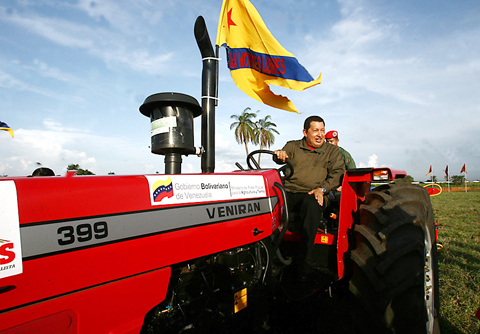Venezuela’s government may take temporary control of a shuttered medicine plant that belongs to Pfizer Inc, a top official said on Friday, suggesting that the New York-based company should resume production.
Venezuela’s consumer protection agency planned to ask Venezuelan President Hugo Chavez to order the takeover after Pfizer closed a medicine factory in the eastern city of Valencia, one of two it has in Venezuela, said Venezuelan Trade Minister Eduardo Saman, who heads the agency.
“We’re very worried, because this plant makes essential medicines that are needed in the country,” the state-run Bolivarian News Agency quoted Saman as saying.

PHOTO: AP
It wasn’t clear when the plant was closed or for what reason and calls seeking comment from Pfizer Venezuela SA in Caracas went unanswered.
A statement from Pfizer in New York said the company “will continue to provide important medicines across a range of key therapeutic areas,” and noted that it is “committed to engaging in an ongoing dialogue with the Venezuelan authorities.”
Local Pfizer workers met with Saman on Thursday and asked the government to take over the factory in order to protect their jobs.
The pharmaceutical giant had received permission from the government to buy a significant amount of dollars to import medicines — an increasingly rare privilege as falling oil prices force Venezuela to restrict access to scarce dollars.
Under currency controls imposed in 2003, Venezuelan companies and individuals need government approval to buy dollars at an officially set exchange rate.
Venezuela’s government this year took control of food-processing plants that allegedly failed to produce pasta and rice at government-set prices, including one rice-processing plant owned by Minnesota-based food giant Cargill.
Chavez on Thursday announced plans to nationalize at least six metal, ceramic and other companies as his government seeks to build an “industrial complex” that he says will help push Venezuela toward his vision of socialism.

Shiina Ito has had fewer Chinese customers at her Tokyo jewelry shop since Beijing issued a travel warning in the wake of a diplomatic spat, but she said she was not concerned. A souring of Tokyo-Beijing relations this month, following remarks by Japanese Prime Minister Sanae Takaichi about Taiwan, has fueled concerns about the impact on the ritzy boutiques, noodle joints and hotels where holidaymakers spend their cash. However, businesses in Tokyo largely shrugged off any anxiety. “Since there are fewer Chinese customers, it’s become a bit easier for Japanese shoppers to visit, so our sales haven’t really dropped,” Ito

The number of Taiwanese working in the US rose to a record high of 137,000 last year, driven largely by Taiwan Semiconductor Manufacturing Co’s (TSMC, 台積電) rapid overseas expansion, according to government data released yesterday. A total of 666,000 Taiwanese nationals were employed abroad last year, an increase of 45,000 from 2023 and the highest level since the COVID-19 pandemic, data from the Directorate-General of Budget, Accounting and Statistics (DGBAS) showed. Overseas employment had steadily increased between 2009 and 2019, peaking at 739,000, before plunging to 319,000 in 2021 amid US-China trade tensions, global supply chain shifts, reshoring by Taiwanese companies and

Taiwan Semiconductor Manufacturing Co (TSMC) Chairman C.C. Wei (魏哲家) and the company’s former chairman, Mark Liu (劉德音), both received the Robert N. Noyce Award -- the semiconductor industry’s highest honor -- in San Jose, California, on Thursday (local time). Speaking at the award event, Liu, who retired last year, expressed gratitude to his wife, his dissertation advisor at the University of California, Berkeley, his supervisors at AT&T Bell Laboratories -- where he worked on optical fiber communication systems before joining TSMC, TSMC partners, and industry colleagues. Liu said that working alongside TSMC

TECHNOLOGY DAY: The Taiwanese firm is also setting up a joint venture with Alphabet Inc on robots and plans to establish a firm in Japan to produce Model A EVs Manufacturing giant Hon Hai Precision Industry Co (鴻海精密) yesterday announced a collaboration with ChatGPT developer OpenAI to build next-generation artificial intelligence (AI) infrastructure and strengthen its local supply chain in the US to accelerate the deployment of advanced AI systems. Building such an infrastructure in the US is crucial for strengthening local supply chains and supporting the US in maintaining its leading position in the AI domain, Hon Hai said in a statement. Through the collaboration, OpenAI would share its insights into emerging hardware needs in the AI industry with Hon Hai to support the company’s design and development work, as well